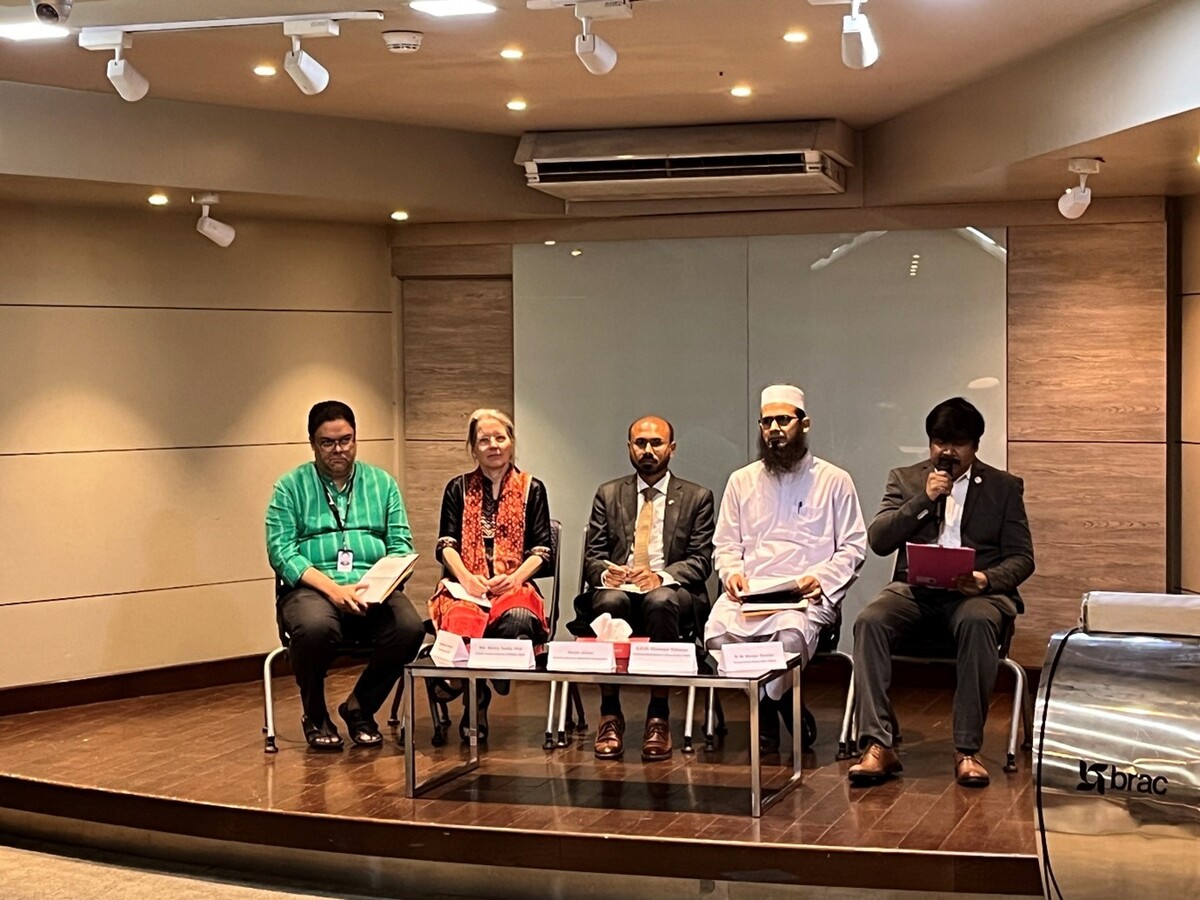Published on: 02/04/2024

Workshop panel participants. Credit: IRC
Which challenges are future WASH services facing in Bangladesh? A panel of experts came together to not only discuss these challenges but also come up with solutions at a workshop arranged on March 14, 2024.
Key topics included financing gaps, the role of local government, sustainability challenges, and the importance of entrepreneurship and technology. The workshop emphasised the need for a multi-pronged approach, involving government, NGOs, and the private sector, to address these issues effectively.
Workshop participants from government and non-government organisations included:
- Hossain Ishrath Adib, Director, Water, Sanitation and Hygiene (WASH) & Integrated Development Programme (IDP) of BRAC
- Md. Zillur Rahman, Programme Head, WASH, BRAC
- Md. Shibly Sadik, PhD, Senior Policy Advisor (IWRM), Embassy of the Kingdom of the Netherlands in Bangladesh
- A.H. M. Khalequr Rahman, Superintending Engineer (Store Circle), Dhaka, DPHE
- Ingeborg Krukkert, Innovation Lead, IRC
- Fayazuddin Ahmad, Advocacy and Campaign Lead, Water Aid
- S.M. Monjur Rashid, Programme Head, Advocacy for Social Change, BRAC
- Dr. Tanvir Ahmed, Professor, ITN, BUET
- Digbijoy Dey, Senior Programme Officer for Asia, IRC), and
- Sk. Towhidur Rahaman, Senior Programme Officer for Asia)
The annual workshop reviewed the progress, challenges and the way forward of the Equitable and Sustainable WASH Services in Bangladesh Delta Plan Hotspots (2022-2026) project. The project is being implemented by BRAC Water, Sanitation and Hygiene Programme with IRCWASH, the Netherlands, as knowledge and innovation partner. A summary of the key areas discussed in the workshop and panel discussion is provided below.
Financing Gaps:
- There's a significant funding gap for WASH service delivery.
- Microfinance can play a role, but policy changes are needed to support WASH entrepreneurs and small businesses.
- Public-private partnerships (PPPs) are promising, but current models focus on large-scale projects, neglecting rural and community needs.
Local Government Role:
- Local government bodies (LGIs) are crucial due to their local reach, but:
- They rely on government funding (ADP) which limits their capacity.
- Lack expertise for WASH project implementation and maintenance.
Sustainability Challenges:
- Operation and Maintenance (O&M) is critical for long-term success of WASH projects. However, challenges include:
- Lack of continuous capacity building for communities and LGIs.
- O&M training methods are often theoretical and not practical.
- Unclear O&M responsibilities among stakeholders (government, communities, NGOs).
Entrepreneurship and Technology:
- Supporting small WASH entrepreneurs is important, but there are hurdles:
- High costs of WASH technologies.
- Difficulty reaching remote areas.
- Outdated regulations.
Key Discussion Points from Audience:
- Reaching the Ultra-Poor: Programmes need to address the specific needs of underprivileged communities with limited financial resources and awareness.
- Inclusion: Project designs should consider the diverse needs of minority and marginalized populations.
- O&M Responsibility: Clear guidelines are needed to establish who is responsible for maintaining WASH facilities in the long run. There are new guidelines in place and there are a few under process of modification or publication. Those guidelines need to be implemented properly to ensure O&M.
Government Initiatives:
- The Local Government Division (LGD) is revising WASH strategies and policies to address gaps, including a focus on hard-to-reach areas.
- The Department of Public Health Engineering (DPHE) is updating its O&M policy to allow for greater involvement in community-level maintenance. They are piloting a 3-tier O&M model with dedicated funding for local communities, LGIs, and DPHE.
Panel Recommendations:
- Collaboration among government, NGOs, and the private sector is essential. It is important to facilitate and improve an environment which encourages private sector to work on sanitation and water and also having a regulatory framework in place.
- Continuous policy development and updates are needed to address financing, capacity building, and O&M challenges.
- Capacity building needs to be a continuous process and needs regular monitoring.
- WASH programs should be inclusive and consider the diverse needs of the Bangladeshi population.
Additional Points from Keynote Speaker Dr. Tanvir Ahmed:
- Revenue Generation: WASH O&M can be sustainable with revenue-generating models. Local governments can learn from Dhaka WASA's successful revenue collection strategy.
- Microfinance: Improved communication and training can increase loan acceptance rates for WASH projects.
- Innovation: New financial instruments like sanitation bonds and community mobilization efforts are needed.
- Academia: Research is needed to identify WASH technology needs based on specific local contexts, especially in remote areas.
Overall, the discussion highlighted the need for a multi-pronged approach that combines financial innovation, capacity building, community engagement, and technological solutions to ensure sustainable WASH access for all in Bangladesh.
About the project
The Equitable and Sustainable WASH Services in Bangladesh Delta Plan Hotspots (2022-2026) project jointly implemented by BRAC and IRC is focusing on three pathways to achieve the project objective to promote and deliver safe water and sanitation services by increasing access to finance (repayable grants), stronger local institutions, introducing (climate resilient) technologies and service delivery models, including more sustainable operation & maintenance mechanisms in 4 climate hotspots of Bangladesh. The pathways are:
Pathway 1 : strengthening access to finance
- Develop and implement a contextualized microcredit model for safely managed water and sanitation in climate
Pathway 2: strengthening service chains for water and sanitation
- Facilitate entrepreneurs with better access to climate resilient technologies and to develop an operation & maintenance model for drinking water and sanitation services in climate hotspots as well as expediting private sector engagement through formal banks and mobile finance services
Pathway 3: strengthening local government institutions
- Support local government institutions to roll out the WASH pro-poor strategy and to strengthen the local subsidy mechanisms for those without access to safe water and sanitation (selected Union Parishads)
Acknowledgements: Reviewed by Ingeborg (Krukkert, Innovation Lead, IRC) & Digbijoy Dey (Senior Program Officer – Asia Regional Program)
